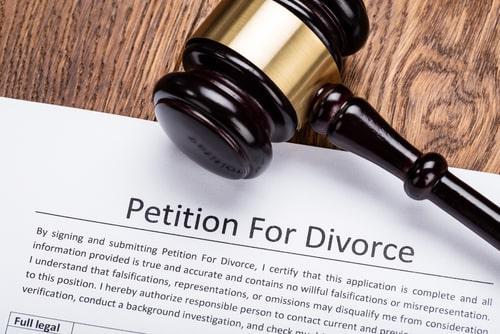Recent Blog Posts
Making Sense of Divorce Statistics
 The Centers for Disease Control and Prevention (CDC) reports that the number of divorces in the United States has actually declined over the past two decades, going from 944,000 divorces and annulments a yearto 630,505 a year. U.S. News and World Report further reported that Illinois had the fifth-lowest divorce rate in the country at 6.2 percent.
The Centers for Disease Control and Prevention (CDC) reports that the number of divorces in the United States has actually declined over the past two decades, going from 944,000 divorces and annulments a yearto 630,505 a year. U.S. News and World Report further reported that Illinois had the fifth-lowest divorce rate in the country at 6.2 percent.
While many people are now of the belief that most marriages will begin with a 50 percent chance of divorce, many experts believe the divorce rate is lower than this. Unfortunately, there are still a multitude of reasons that a marriage can end these days. If you are planning to divorce, make sure to work with an experienced divorce attorney who can help you throughout the process.
Common Issues in an Illinois Divorce Case
While divorce might be becoming less common than it was 20 years ago, many people still deal with divorce issues like property division, child custody, and spousal maintenance every year. While the overall divorce rate has decreased, the over-50 population has seen a dramatic increase in divorce cases. Older people are divorcing at a much higher rate than the younger crowd. With age often comes increased financial resources, including complex assets like investments and real estate. Dividing property in a “gray divorce” often presents a unique challenge.
How Does Equitable Distribution Work?
 Many people who have friends in other states who have gone through a divorce can are surprised to learn that property division during divorce varies from state to state. Community property laws dictate a 50-50 split of all marital property. Illinois is among the majority of states using equitable division laws as opposed to community property laws. Equitable distribution involves a fair but not necessarily equal distribution of marital assets.
Many people who have friends in other states who have gone through a divorce can are surprised to learn that property division during divorce varies from state to state. Community property laws dictate a 50-50 split of all marital property. Illinois is among the majority of states using equitable division laws as opposed to community property laws. Equitable distribution involves a fair but not necessarily equal distribution of marital assets.
Illinois law can be rather complex when it comes to determining the distribution of marital property, and a number of factors can influence court decisions in these cases. The value of property, the spouses’ earning capacity, and each party’s contribution to the marital estate can all be factors that dictate how property will be distributed.
How Equitable Distribution Applies to Your Divorce
Courts only utilize equitable distribution when divorcing spouses cannot negotiate an agreement regarding their marital property settlement. Equitable distribution will only apply to marital property, or the property that was acquired during the marriage. It does not include property obtained during the marriage by gift or inheritance, which is considered separate property.
Gray Divorces Are Only Getting More Common
 Earlier this year, the American Bar Association (ABA) said that while the overall divorce rate in the United States was on the decline, the one group seeing an increase was the so-called “gray-haired” demographic. People 50 years of age or older account for 25 percent of all divorces, and 1 in 10 individuals getting divorced are 65 years of age or older. Anybody who is going through a gray divorce in the greater Naperville area will want to be sure they are working with an experienced divorce attorney for people in retirement or near retirement.
Earlier this year, the American Bar Association (ABA) said that while the overall divorce rate in the United States was on the decline, the one group seeing an increase was the so-called “gray-haired” demographic. People 50 years of age or older account for 25 percent of all divorces, and 1 in 10 individuals getting divorced are 65 years of age or older. Anybody who is going through a gray divorce in the greater Naperville area will want to be sure they are working with an experienced divorce attorney for people in retirement or near retirement.
There are certainly advantages to getting a divorce when you are older, as there is less likelihood for adverse effects on children who are presumably grown up and out of the house by this point. There can still be a number of complicated issues for people to deal with in these cases, however.
Making Gray Divorces Work
How Modifications Work in Divorce Cases
 When a couple gets divorced, they either negotiate a settlement regarding property division, child custody, and other divorce matters, or a decision is handed down by the court. However, It is not uncommon for circumstances to change among divorced individuals, and certain changes can create a need for people to modify or enforce their divorce agreements.
When a couple gets divorced, they either negotiate a settlement regarding property division, child custody, and other divorce matters, or a decision is handed down by the court. However, It is not uncommon for circumstances to change among divorced individuals, and certain changes can create a need for people to modify or enforce their divorce agreements.
Common Kinds of Divorce Modifications
Certain kinds of divorce issues are more common for modifications, while many others will be viewed as being somewhat settled law. Martial property division matters, for example, are usually not going to be something a court revisits.
Some of the areas that may be more likely to see modifications include, but are not limited to:
-
Spousal Maintenance — Spousal support payments can be modified when financial situations change for either party. Under 750 Illinois Consolidated Statute § 5/510, spousal maintenance may be modified upon any substantial change in circumstances for either party. The three most common reasons for modifications of spousal maintenance payments are former spouses cohabitating with new partners, former spouses remarrying, or former spouses dying.
What to Know About Infidelity Concerning Your Illinois Divorce
 Infidelity is one of the top reasons for a divorce. The trust and commitment that the married couple had agreed upon have broken down and been betrayed. Though the unfaithful act may cause a marriage to break down, it is often unclear exactly how it affects the divorce.
Infidelity is one of the top reasons for a divorce. The trust and commitment that the married couple had agreed upon have broken down and been betrayed. Though the unfaithful act may cause a marriage to break down, it is often unclear exactly how it affects the divorce.
What is a No-Fault Divorce?
As of 2016, the state of Illinois recognized irreconcilable differences as the sole grounds for a divorce. Because of this, one spouse cannot blame the other’s actions as the primary reason for the divorce. This is beneficial for the spouse that is petitioning for the dissolution of the marriage in that they are not required to prove that the other spouse is at fault. They must only prove that the couple’s differences are too great for the marriage to continue.
However, this means that despite the infidelity, the spouse’s actions will not be held against them in accordance with the outcome of the divorce. As far as property division is concerned, they are determined through other factors including:
How Long Will My Illinois Divorce Take?
 It is no secret that a divorce can be a lengthy process. If the relationship between the couple has become increasingly hostile, it can be exceptionally difficult. Conversely, if the couple wishes to end the marriage but seeks an uncontested divorce, then their compromises and agreements on many issues can expedite the process quite a bit. Depending on a multitude of issues, you can expect a divorce to take anywhere from several months to several years. The key factor is how much conflict lies between you and your spouse.
It is no secret that a divorce can be a lengthy process. If the relationship between the couple has become increasingly hostile, it can be exceptionally difficult. Conversely, if the couple wishes to end the marriage but seeks an uncontested divorce, then their compromises and agreements on many issues can expedite the process quite a bit. Depending on a multitude of issues, you can expect a divorce to take anywhere from several months to several years. The key factor is how much conflict lies between you and your spouse.
What Factors Influence the Duration of a Divorce?
A divorce is one of those unfortunate events in one’s life that most typically want to end as quickly as possible. There are certain criteria and steps that can be taken to help get you through it faster.
Children complicate the process exponentially. The courts are seeking the fairest outcome for all parties involved, especially if there are any children. Determining what is best for the children will take additional time. Parenting plans and custody will have to be established. The living situations of the spouses will certainly change and most likely impact the children’s life drastically.
What You Should Know About Non-Minor Support for Your Illinois Divorce
 Divorce is already a complicated process, but when there are dependents involved, it further complicates matters. Children are the typical dependents involved in a divorce, and most financial support will end when the child reaches eighteen years of age or graduates from high school. There are other instances, however, in which additional support may be required for a dependent who is no longer a minor.
Divorce is already a complicated process, but when there are dependents involved, it further complicates matters. Children are the typical dependents involved in a divorce, and most financial support will end when the child reaches eighteen years of age or graduates from high school. There are other instances, however, in which additional support may be required for a dependent who is no longer a minor.
Just because your child reaches the age of eighteen does not mean they no longer need support. A divorce disrupts many things, but the parents and the courts can work together to find what will be best for a dependent’s future.
What Instances Would Require Non-Minor Child Support?
The state of Illinois can require support for someone over the age of eighteen in a few specific circumstances. While many factors go into the decision of the court to instate support for a non-minor, the two main reasons are education and the health of the child.
How Will Mediation Help During My Illinois Divorce?
 During a divorce, the couple is encouraged to agree on how to divide their property and settle outstanding issues. This can be a simple task for some amicable couples, but it can become a struggle for others. If agreements can be reached outside of court, it will speed up the proceedings. When the spouses cannot reach an agreement on several issues, introducing a mediator may be highly beneficial.
During a divorce, the couple is encouraged to agree on how to divide their property and settle outstanding issues. This can be a simple task for some amicable couples, but it can become a struggle for others. If agreements can be reached outside of court, it will speed up the proceedings. When the spouses cannot reach an agreement on several issues, introducing a mediator may be highly beneficial.
Mediation is common in many divorces and is a fair way to ensure that both parties have an opportunity to voice their opinions. In many cases, mediation helps spouses mutually agree on how to dissolve the marriage. With a third party facilitating the conversation, many outstanding disagreements may be solved outside of a courtroom.
What Role Does the Mediator Play?
A mediator is a third party who will help the couple divide property and resolve outstanding issues within the marriage including:
How Do I Begin my DuPage County Divorce?
 Initiating the process of beginning a divorce can seem like an impossible task. Not only does a divorce take an immense emotional toll on everyone involved, but it can also be overwhelming to navigate through all of the legal proceedings and logistics of the process. As is the case with many things in life, starting can be the hardest part. Fortunately, the Law Office of Ronald L. Hendrix, P.C. has years of experience to help you take that first step so you may begin your new life.
Initiating the process of beginning a divorce can seem like an impossible task. Not only does a divorce take an immense emotional toll on everyone involved, but it can also be overwhelming to navigate through all of the legal proceedings and logistics of the process. As is the case with many things in life, starting can be the hardest part. Fortunately, the Law Office of Ronald L. Hendrix, P.C. has years of experience to help you take that first step so you may begin your new life.
Determining your Situation
There are many considerations at the beginning of the divorce process, but to determine how to begin, you must first assess the marriage itself.
How to approach the dissolution of the marriage will depend on many factor. Ask yourself:
-
Is the divorce contested? Both parties must be in agreement to end the marriage, otherwise, it will be a contested divorce. If it is contested, this will affect how property, finances, and custody issues of the spouses must be resolved. An uncontested divorce is one in which both spouses agree on property division, child custody, and other relevant divorce issues. An uncontested divorce is usually a quicker process, but still may take several months to make it official.
How Will A Prenuptial Agreement Affect My Will County Divorce?
 When a couple initially gets married, divorce is hopefully far from their minds. However, in the event the spouses do decide to end the marriage, dividing assets can be quite complicated. If you are at all concerned about losing money or property in a divorce, a prenuptial agreement might be a route you need to take. But what exactly are prenuptial agreements, and how do they protect you?
When a couple initially gets married, divorce is hopefully far from their minds. However, in the event the spouses do decide to end the marriage, dividing assets can be quite complicated. If you are at all concerned about losing money or property in a divorce, a prenuptial agreement might be a route you need to take. But what exactly are prenuptial agreements, and how do they protect you?
What Are Prenuptial Agreements?
A prenuptial agreement, or premarital agreement, refers to an agreement that the two spouses have made prior to their marriage. It must be signed by both parties and helps establish what property belongs to each spouse. They are more common in marriages involving a larger scope of wealth and many assets they could potentially lose in a divorce.
For an agreement to be effective certain qualifiers must be met:
-
Both parties must be present and in agreement

















